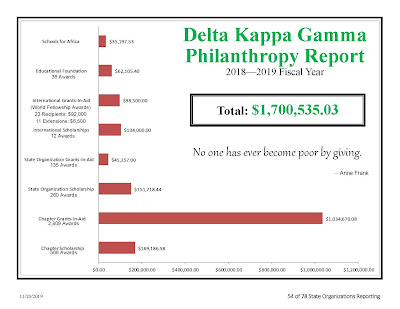Labels
- Annie
- Arts & Humanities Jury
- Communications and Marketing Committee
- Constitution Committee
- DKGIEF
- Editorial Board
- Educators Book Award
- EEC
- Finance Committee
- Golden Gift Committee
- Holden Fund Committee
- International Issues Task Force
- ISF
- Leadership Development Committee
- Leadership Discovery Centre
- Membership/Expansion Committee
- Nominations Committee
- Non-dues Revenue Committee
- Scholarship Committee
- US Forum
- World Fellowship Committee
Search This Blog
Tuesday, December 24, 2019
Ceremonies Revamped
Do you have a chapter induction or installation ceremony coming up and you can’t find that old red ceremonies booklet? Never fear, while that red booklet has been retired you can still find sample ceremonies on the international website under the Resources tab and then Ceremonies. You read that correctly, there are no official ceremonies but just samples which you can personalize to meet the needs of your chapter. Some of the sample ceremonies you can find here include: chapter induction, installation of chapter officers, founders’ day, recommitment and ceremony of life.
Thursday, December 19, 2019
What Successful Teachers Do: A Dozen Things to Ensure Student Learning
Mary C. Clement
Dr. Clement is a “key woman educator” in DKG.
Pro’s
This book affirms teachers—we need that at all stages of our career.
• The format of the book provides for guidance in an “easy read.”
• Many highlights of each chapter provide a summary and a “quick read.”
• The author acknowledges the pleasure and the challenges of being a teacher.
• Information in this book applies across national/international boundaries—addresses needs of learners and teachers generally.
• Teachers in training are not aware of what they need; student teachers are just overwhelmed; newly-minted teachers follow the paths and sage suggestions of their mentor teachers. After about 5-9 years in the classroom, teachers begin to recall “something” they read once—heard once, but they have difficulties recalling the details. This book guides them back to the theories and affirms their practices as well as providing new ideas for activities or new variations on “tried and true” activities. Teachers are refreshed; teachers are reborn; teachers are reassured that what they have been doing is effective for student learning.
• The book synthesizes research and applies it to the classroom for teachers who do not have the time to do in-depth reading and research on their own because their focus is on their own learners.
• The focus is on learning, not teaching.
Con’s
• Some may contend that the book is only a recapitulation of education classes for teaching majors and students should have retained that information. Life does not always reflect “what should be.”
• Includes Common Core, which is no longer a federal mandate, but it may be still called that in the author’s state. It is not a state program and may yet reflect much of CC.
This could be great as a gift when teachers earn tenure—affirmation of their achievements and a guide for the next stage.
Thursday, December 5, 2019
Scholarship vs Grant-in-aid
Many members ask what the difference is between a
scholarship and a grant-in-aid. For
reporting purposes scholarships are awarded to Delta Kappa Gamma members and grants-in-aid are awarded to non-members.
Chapters and state organizations can call them whatever they choose,
keeping in mind how it is reported each year.
Grants-in-aid and scholarships are awarded at all levels of
the Society. At the international level the Scholarship Committee awards
$10,000 to qualifying members pursuing a PhD and $6,000 to qualifying members pursuing
an advanced degree. At the international level, grants-in-aid are awarded by the
World Fellowship Committee to non-members attending a college or university in
the United States or an approved university in Canada. State organizations give
scholarships to qualifying members working on degrees, receiving special
training, professional development or grants-in-aid to non-members in either
high school or college. Many chapters give scholarships to qualifying members
furthering their education and grants-in-aid to non-members in high school or
college.
At the international convention in Austin in 2018, the
convention attendees voted to amend the governing documents of the Society so
that scholarship fees paid annually by members go to the state organization and
to the chapter, if the chapter has a scholarship fund. A portion of the scholarship fee is no longer
part of the revenue for the DKG International Scholarship Fund. Funding for international
scholarships comes from contributions, bequests, and income from investments.
International, state organizations and chapters advertise
their grants-in-aid and scholarships through their newsletters, websites,
social media, and personal contacts. Members and state organizations are
encouraged to give donations and bequests to the DKG International Scholarship
Fund. Most importantly both grants-in-aid and scholarships support the vision
of DKG, “Leading Women Educators Impacting Education Worldwide”.
Wednesday, December 4, 2019
Educating for Empathy
Educating for Empathy by Nicole Mirra is another book that was reviewed by the Educators Book Award
Committee. While it did not receive an award or honorable mention, the
committee felt is could be a valuable resource.
This book
explores the political charged climate teachers and students are living in both
nationally and globally and seeks to instill a sense of empathy within the K-12
curriculum.
According to Mirra the deliberate
teaching of empathy in education can prepare students to tackle the challenges
of the 21st century and beyond with compassion and commitment toward
equity and justice. Using the English
Language Arts Curriculum literature becomes the vehicle through which empathy
can be taught to students K-12. In Mirra’s book each chapter includes practical tools and
discussion questions to promote empathy.
Educating
for Empathy provides ideas for teachers struggling with bullying and hate
talk in schools and society. In Nicole Mirra’s words, “The development of
empathy in students (and teachers) should be considered a primary goal of
education because it offers an organizing principle for our field grounded in
hope, love, and a commitment to a more equitable society.”
Subscribe to:
Posts (Atom)
Popular Posts
-
The new and greatly improved DKG app is here. This app will quickly become your “go-to” source for information from International...
-
A HUGE bang for your buck$ is the DKG News. It is published 6 times a year, bimonthly, and can be accessed on the DKG web under Publications...
-
A main reason Delta Kappa Gamma was founded is still valid: women teachers need the support of each other. Chapters provide a have...






